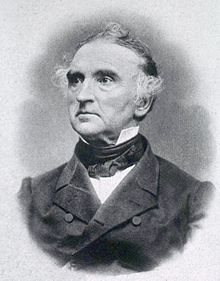Justus Liebig
| Justus von Liebig | |
|---|---|
 |
|
| Born |
12 May 1803 Darmstadt, Grand Duchy of Hesse |
| Died | 18 April 1873 (aged 69) Munich, German Empire |
| Residence | Grand Duchy of Hesse, then German Empire |
| Nationality | Hessian, then German |
| Fields | Chemistry |
| Institutions |
University of Giessen University of Munich |
| Alma mater |
University of Bonn University of Erlangen |
| Doctoral advisor | Karl Wilhelm Gottlob Kastner |
| Doctoral students |
Carl Schmidt Nikolay Zinin Victor Regnault Carl von Voit Hermann von Fehling Hermann Franz Moritz Kopp August Kekulé August von Hofmann Lyon Playfair Emil Erlenmeyer Heinrich Ritthausen Moritz Traube Adolph Strecker Wilhelm Henneberg |
| Other notable students |
Augustus Voelcker Julius Eugen Schlossberger Karl Vogt Max Joseph von Pettenkofer |
| Known for |
Law of the Minimum Liebig condenser |
| Notable awards | Albert Medal (1869) |
Justus Freiherr von Liebig (12 May 1803 – 18 April 1873) was a German chemist who made major contributions to agricultural and biological chemistry, and was considered the founder of organic chemistry. As a professor at the University of Giessen, he devised the modern laboratory-oriented teaching method, and for such innovations, he is regarded one of the greatest chemistry teachers of all time. He has been described as the "father of the fertilizer industry" for his emphasis on nitrogen and trace minerals as essential plant nutrients, and his formulation of the Law of the Minimum which described how plant growth relied on the scarcest nutrient resource (limiting factor), rather than the total amount of resources available. He also developed a manufacturing process for beef extracts, and founded a company, Liebig Extract of Meat Company, that later trademarked the Oxo brand beef bouillon cube. He popularized (though he did not invent) the Liebig Condenser.
Justus von Liebig was born in Darmstadt into the middle-class family of Johann Georg Liebig and Maria Caroline Möser in early May 1803. His father was a drysalter and hardware merchant who compounded and sold paints, varnishes and pigments, which he developed in his own workshop. From childhood Justus was fascinated with chemistry.
At the age of 13, Liebig lived through the year without a summer, when the majority of food-crops in the northern hemisphere were destroyed by a volcanic winter. Germany was among the hardest-hit in the global famine that ensued, and the experience is said to have shaped Liebig's later work. Thanks in part to Liebig's innovations in fertilizers and agriculture, the 1816 famine became known as "the last great subsistence crisis in the Western world".
...
Wikipedia
